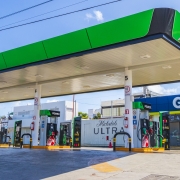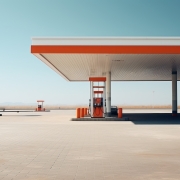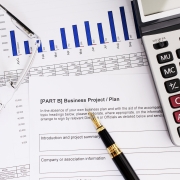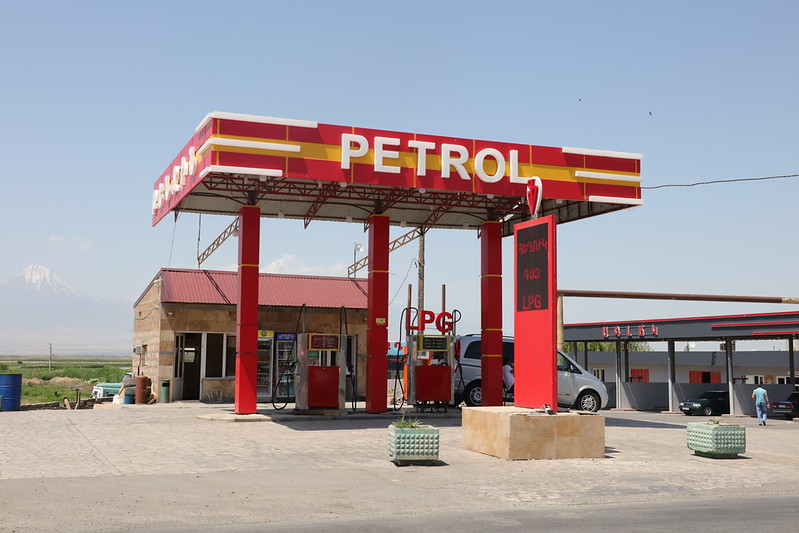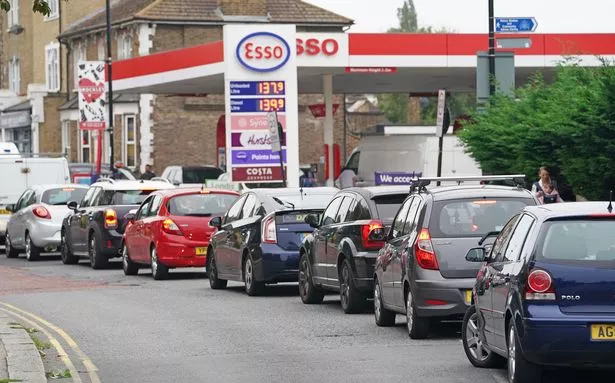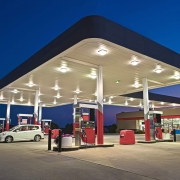Building a petrol station in Tanzania involves a multitude of costs, ranging from the visible ones like office buildings, fuel pumps, storage tanks, concrete paving, and canopies, to the less apparent expenses that often catch investors by surprise.
In this article, we’ll explore five hidden costs to help you craft a robust budget and steer clear of unexpected financial hurdles during your petrol station project.
1.Piping and Signage Installation.
Constructing a petrol station in Tanzania requires meticulous attention to the installation of piping and signage, two often-overlooked yet essential components.
Piping is the backbone of fuel distribution, ensuring the smooth and efficient operation of your station. Equally important is the strategic placement of signage, which not only guides customers but also ensures compliance with regulatory requirements.
Failing to allocate a sufficient budget for these vital elements can lead to delays, legal issues, and operational disruptions, ultimately jeopardizing the success of your project.
By prioritizing the installation of piping and signage and factoring in their associated costs, you can safeguard your petrol station’s long-term viability and provide a seamless experience for your customers.
2.Excavation, Fence Foundation, and Storage Tank Installation
Preparing the site for a petrol station in Tanzania involves more than just placing the storage tanks. Excavation work is required to create a stable foundation for the entire site, including the fencing perimeter.
The costs associated with this excavation can vary significantly based on factors such as the soil conditions and local regulatory standards.
Additionally, constructing a sturdy foundation for the fencing is essential to ensure the safety and security of the station.
Failing to allocate adequate funds for these essential site preparation activities can lead to delays in the project timeline and even potential legal complications, ultimately impacting the overall budget. Careful planning and close attention to these hidden costs are crucial to avoid unexpected financial hurdles and ensure the successful execution of the petrol station project.
3.Compressor Control Panel, Cabling, and Lighting.
Petrol stations rely on intricate systems to function efficiently and safely. Components such as compressor control panels, cabling, and lighting are indispensable for ensuring operational integrity and regulatory compliance.
Budgeting for these essential systems is paramount to avoid unexpected expenses and operational disruptions. Failure to account for these costs upfront can lead to project delays and compromised safety standards, necessitating costly retrofits in the future.
Investing in robust compressor control panels, high-quality cabling, and comprehensive lighting solutions not only enhances the station’s functionality but also demonstrates a commitment to safety and compliance, crucial factors in the successful operation of a petrol station in Tanzania.
The Hidden Costs of Building a Petrol Station in Tanzania
Depending on the location of your petrol station, levelling the terrain may be necessary to create a stable foundation and ensure proper drainage. The cost of levelling can vary based on factors such as the topography of the site and the extent of the required adjustments.
Factors like the quality and composition of the soil, the need for excavation, and the complexity of the site preparation work can all contribute to the levelling expenses.
Overlooking levelling costs in your budgeting process can result in construction delays, structural issues, and potential safety concerns, jeopardizing the long-term viability of your petrol station. Proper planning and allocation of resources for levelling are essential to ensure a solid foundation and mitigate any unforeseen challenges that may arise during the construction phase.
4: Levelling.
Depending on the location of your petrol station, levelling the terrain may be necessary to create a stable foundation and ensure proper drainage.
The cost of levelling can vary based on factors such as the topography of the site and the extent of the required adjustments.
Overlooking levelling costs in your budgeting process can result in construction delays and structural issues, jeopardizing the long-term viability of your petrol station.
Proper assessment of the site and allocation of funds for levelling work are crucial to ensuring a stable and well-functioning petrol station.
Budgeting Strategies for a Petrol Station in Tanzania
Comprehensive cost analysis is crucial when building a petrol station in Tanzania.
Beyond the obvious expenses like structures and equipment, savvy investors must account for a myriad of hidden costs that can quickly add up and derail the project budget.
Prudent contingency planning, allocating funds for unforeseen circumstances, is equally vital to navigate the inherent uncertainties of construction.
Furthermore, seeking expert advice from experienced professionals in the field can provide invaluable insights to ensure a robust financial blueprint for your petrol station venture.
By adopting a meticulous approach to budgeting, complete with rigorous cost analysis, contingency measures, and expert guidance, you can position your project for long-term success and mitigate the risk of costly surprises.
The Importance of Thorough Planning for Petrol Station Projects.
Thorough planning is essential for ensuring the long-term success and profitability of a petrol station project in Tanzania.
By carefully considering the potential financial surprises and carefully budgeting for all necessary expenses, investors can mitigate the risk of unexpected costs and ensure the viability of their project.
Mitigating financial surprises is a crucial aspect of thorough planning. Petrol station projects involve a wide range of hidden costs, such as the installation of piping and signage, excavation work, and the construction of compressor control panels and lighting systems.
Failing to account for these expenses can lead to delays, regulatory issues, and cost overruns, which can ultimately jeopardize the project’s overall success.
By anticipating and budgeting for these hidden costs, investors can avoid being caught off guard and ensure the smooth execution of the project.
Moreover, thorough planning is essential for ensuring the long-term profitability of the petrol station. By carefully analyzing the project’s viability and potential revenue streams, investors can make informed decisions and develop a robust business model that can withstand market fluctuations and industry challenges.
This, in turn, helps to secure the project’s long-term success and the achievement of the investor’s financial goals.
In conclusion, the importance of thorough planning for petrol station projects in Tanzania cannot be overstated. By mitigating financial surprises, ensuring project viability and profitability, and achieving long-term success, investors can maximize their chances of building a thriving and sustainable petrol station that meets the needs of the local community.
Regulatory Considerations for a Petrol Station in Tanzania.
When building a petrol station in Tanzania, adhering to local and national regulations is of paramount importance.
Navigating the permitting and licensing processes can be a complex and time-consuming endeavor, requiring a thorough understanding of the legal framework.
Failure to comply with these regulatory requirements can lead to legal complications, delays, and potential fines or penalties that can significantly impact the project’s budget and timeline.
It is essential to dedicate sufficient resources to researching and understanding the regulatory environment, engaging with local authorities, and ensuring that all necessary permits and licenses are obtained in a timely manner.
By proactively addressing regulatory considerations, investors can mitigate the risk of unexpected legal issues and maintain a smooth path towards the successful completion of their petrol station project.
Ensuring the Success of Your Petrol Station Project
In conclusion, the hidden costs associated with building a petrol station in Tanzania can significantly impact the overall success of your project. By thoroughly planning and budgeting for expenses such as piping and signage installation, excavation and storage tank installation, compressor control panels and lighting, as well as levelling the site, you can mitigate the risk of unexpected financial obstacles and ensure the long-term viability of your petrol station. Careful consideration of these often-overlooked costs, coupled with diligent oversight throughout the construction process, will be crucial in realizing your vision for a functional and profitable petrol station that serves the needs of the local community. Thorough budgeting and planning are the keys to overcoming the hidden hurdles and achieving the success you desire for your petrol station project in Tanzania.
4.The Hidden Costs of Building a Petrol Station in Tanzania
Depending on the location of your petrol station, levelling the terrain may be necessary to create a stable foundation and ensure proper drainage.
The cost of levelling can vary based on factors such as the topography of the site and the extent of the required adjustments. Factors like the quality and composition of the soil, the need for excavation, and the complexity of the site preparation work can all contribute to the levelling expenses.
Overlooking levelling costs in your budgeting process can result in construction delays, structural issues, and potential safety concerns, jeopardizing the long-term viability of your petrol station.
Proper planning and allocation of resources for levelling are essential to ensure a solid foundation and mitigate any unforeseen challenges that may arise during the construction phase.
Unexpected Regulatory and Compliance Requirements
Petrol station projects in Tanzania face an additional layer of complexity due to the ever-evolving regulatory landscape. Potential changes in local or national regulations can introduce unexpected requirements, necessitating adjustments to the project plan and budget.
Careful research and communication with relevant authorities are crucial to anticipating and planning for these regulatory shifts. Budgeting for ongoing compliance measures, such as updating infrastructure, training staff, and submitting required documentation, is essential to avoid project delays and legal issues down the line. Proactively addressing regulatory requirements can help ensure the smooth and timely execution of the petrol station project, minimizing disruptions and financial surprises.
Budgeting Strategies for a Petrol Station in Tanzania
Comprehensive cost analysis is crucial when building a petrol station in Tanzania. Beyond the obvious expenses like structures and equipment, savvy investors must account for a myriad of hidden costs that can quickly add up and derail the project budget. Prudent contingency planning, allocating funds for unforeseen circumstances, is equally vital to navigate the inherent uncertainties of construction. Furthermore, seeking expert advice from experienced professionals in the field can provide invaluable insights to ensure a robust financial blueprint for your petrol station venture. By adopting a meticulous approach to budgeting, complete with rigorous cost analysis, contingency measures, and expert guidance, you can position your project for long-term success and mitigate the risk of costly surprises.
The Importance of Thorough Planning for Petrol Station Projects
Thorough planning is essential for ensuring the long-term success and profitability of a petrol station project in Tanzania. By carefully considering the potential financial surprises and carefully budgeting for all necessary expenses, investors can mitigate the risk of unexpected costs and ensure the viability of their project.
Mitigating financial surprises is a crucial aspect of thorough planning. Petrol station projects involve a wide range of hidden costs, such as the installation of piping and signage, excavation work, and the construction of compressor control panels and lighting systems. Failing to account for these expenses can lead to delays, regulatory issues, and cost overruns, which can ultimately jeopardize the project’s overall success. By anticipating and budgeting for these hidden costs, investors can avoid being caught off guard and ensure the smooth execution of the project.
Moreover, thorough planning is essential for ensuring the long-term profitability of the petrol station. By carefully analyzing the project’s viability and potential revenue streams, investors can make informed decisions and develop a robust business model that can withstand market fluctuations and industry challenges. This, in turn, helps to secure the project’s long-term success and the achievement of the investor’s financial goals.
In conclusion, the importance of thorough planning for petrol station projects in Tanzania cannot be overstated. By mitigating financial surprises, ensuring project viability and profitability, and achieving long-term success, investors can maximize their chances of building a thriving and sustainable petrol station that meets the needs of the local community.
Regulatory Considerations for a Petrol Station in Tanzania
When building a petrol station in Tanzania, adhering to local and national regulations is of paramount importance. Navigating the permitting and licensing processes can be a complex and time-consuming endeavor, requiring a thorough understanding of the legal framework. Failure to comply with these regulatory requirements can lead to legal complications, delays, and potential fines or penalties that can significantly impact the project’s budget and timeline. It is essential to dedicate sufficient resources to researching and understanding the regulatory environment, engaging with local authorities, and ensuring that all necessary permits and licenses are obtained in a timely manner. By proactively addressing regulatory considerations, investors can mitigate the risk of unexpected legal issues and maintain a smooth path towards the successful completion of their petrol station project.
Ensuring the Success of Your Petrol Station Project
In conclusion, the hidden costs associated with building a petrol station in Tanzania can significantly impact the overall success of your project.
By thoroughly planning and budgeting for expenses such as piping and signage installation, excavation and storage tank installation, compressor control panels and lighting, as well as levelling the site, you can mitigate the risk of unexpected financial obstacles and ensure the long-term viability of your petrol station.
Careful consideration of these often-overlooked costs, coupled with diligent oversight throughout the construction process, will be crucial in realizing your vision for a functional and profitable petrol station that serves the needs of the local community.
Thorough budgeting and planning are the keys to overcoming the hidden hurdles and achieving the success you desire for your petrol station project in Tanzania.

